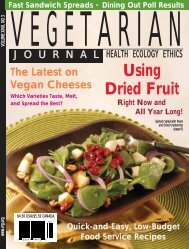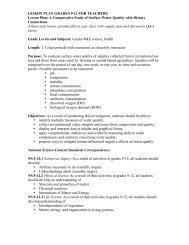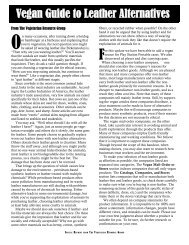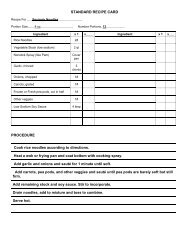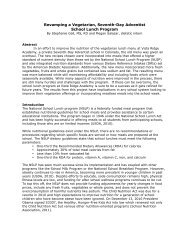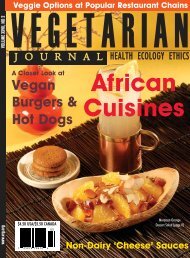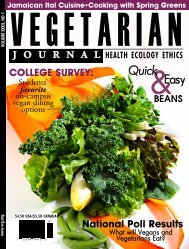Is Your Sugar Vegan? - The Vegetarian Resource Group
Is Your Sugar Vegan? - The Vegetarian Resource Group
Is Your Sugar Vegan? - The Vegetarian Resource Group
You also want an ePaper? Increase the reach of your titles
YUMPU automatically turns print PDFs into web optimized ePapers that Google loves.
<strong>Is</strong> <strong>Your</strong> <strong>Sugar</strong> <strong>Vegan</strong><br />
An Update on <strong>Sugar</strong> Processing Practices<br />
By Jeanne Yacoubou, MS<br />
IN 1997, THE VEGETARIAN RESOURCE GROUP<br />
published an article on sugar refining, focusing<br />
in particular on the char derived from cow bones<br />
that is used as a filter to whiten cane sugar during the<br />
refining process. In this report, <strong>The</strong> VRG revisits the<br />
issue of bone char use in the sugar industry, examines<br />
emerging practices for refining sugar, and discusses<br />
alternatives to sugar refined with bone char.<br />
WHERE THE SUGAR INDUSTRY STANDS<br />
TODAY<br />
<strong>The</strong> sugar industry’s practices haven’t changed much<br />
over the past decade. <strong>The</strong> same large American cane<br />
sugar companies that were operating then are still in<br />
business and have bought out smaller operations in<br />
the United States. <strong>The</strong>re are a few small cane sugar<br />
companies, but there are really only two large cane<br />
sugar enterprises—Imperial/Savannah Foods (Dixie<br />
Crystal) and Florida Crystals. Florida Crystals owns<br />
American <strong>Sugar</strong> Refining (Domino Foods) as well as<br />
the C&H <strong>Sugar</strong> Company, both of which now call<br />
bone char “natural charcoal.”<br />
<strong>The</strong> two major companies refine most of the sugar<br />
sold on store shelves in the United States. <strong>The</strong> majority<br />
of this sugar is produced and consumed domestically,<br />
although some of the sugar sold by American <strong>Sugar</strong><br />
Refining is purchased from Australia or Brazil. (By<br />
comparison, much of the sugar in packaged products<br />
sold in the United States is imported.)<br />
<strong>The</strong> U.S. companies still use cow bone char as<br />
the preferred filter for cane sugar. <strong>The</strong> exception is a<br />
plant that American <strong>Sugar</strong> Refining owns in Yonkers,<br />
NY, which uses an ion exchange system that cost $30<br />
million. <strong>The</strong>ir refining process is quite different and<br />
involves liquid sugar that cannot be filtered through<br />
bone char. Jeffrey Robinson, Technical Director of<br />
American <strong>Sugar</strong> Refining, said the Yonkers, NY, plant<br />
is only the company’s fourth-highest producing plant<br />
of five plants, yielding approximately 4 million pounds<br />
of sugar per day. On another note, Paul Caulkins, the<br />
Corporate Quality Assurance Manager of Imperial/<br />
Savannah Foods, said his company is seriously looking<br />
into overhauling its filtering system at a price tag of $25<br />
million because there have been recent improvements<br />
in ion exchange filter technology.<br />
In 1997, <strong>The</strong> VRG reported that Refined <strong>Sugar</strong>s,<br />
Inc., maker of Jack Frost sugar, used granular carbon<br />
instead of bone char. Refined <strong>Sugar</strong>s was one of the<br />
companies bought out by Domino, which uses bone<br />
char for most of its sugars. (See the table on page 18<br />
for the names of Domino’s non-organic and organic<br />
brands that are not filtered through bone char.) Jack<br />
Frost sugar is still being produced at their Yonkers plant.<br />
It is available in New York and northern Pennsylvania<br />
and constitutes approximately 0.5 percent of Domino’s<br />
total sugar production.<br />
Imperial <strong>Sugar</strong> produces a turbinado sugar that has<br />
not been processed through bone char. <strong>The</strong> Imperial<br />
<strong>Sugar</strong> Company is part owner of Wholesome Sweeteners,<br />
which produces several brands of sweeteners that are<br />
not filtered through bone char. (See table on page 18.)<br />
VegNews published a 2006 article stating that a small<br />
cane sugar company, U.S. <strong>Sugar</strong> Corporation, uses a<br />
‘new’ sugar refining process that does not involve bone<br />
char. U.S. <strong>Sugar</strong> has not responded to several phone<br />
calls that <strong>The</strong> VRG has made regarding their cane<br />
sugar refining process.<br />
WHY BONE CHAR IN THE FIRST PLACE<br />
<strong>The</strong> average consumer’s love affair with white, sweet<br />
foods prompted the sugar industry to develop a sugar<br />
refining process that would yield ‘pure’ white crystals.<br />
Hundreds of years ago, sugar refiners discovered that<br />
bone char from cattle worked well as a whitening filter,<br />
and this practice is now the industry standard.<br />
<strong>Sugar</strong> cane has held an approximately 50 percent<br />
market share of sugar in recent history, with sugar from<br />
sugar beets taking the rest. Beet sugar is not refined<br />
in the same way as cane sugar. Bone char filtering is<br />
never used in beet sugar processing.<br />
Unfortunately for consumers buying prepackaged,<br />
sweetened foods or those eating out, it is difficult to<br />
VEGETARIAN JOURNAL <strong>Is</strong>sue Four 2007 15



